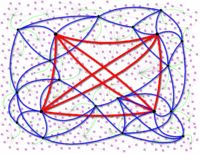You squeeze programs, storage, and compute power into a tight little bundle, ignoring things like what OS was used through virtualization. You use parallelism to make the whole system available to any single program that may need a huge calculation or a "rush to the rail" for a Web site.
But to Apple, a cloud is just a general term for hosting files. Its iCloud will be just that, with only proprietary systems supported, with only its files hosted. The "savings" — such as they are — will be Apple's, because if your iTunes library has Dire Straits' "My Party" and so does yours, they'll just store it once. Big deal.

For cloud computing to provide real value, it has to break these bonds of proprietary systems and proprietary data. A real cloud works for any person, for any program, for any file type, and it does so in the most efficient manner possible.
So we'll have this deliberate confusion for the next couple of years, as those whose jobs and business models are threatened by cloud computing try to deny the reality and put "cloud" in front of what they're doing, hoping no one will notice.
But Moore's Law is relentless. You can support inefficiency against it for only so long. But it will have its way. The cost savings will prove irresistible, and in 2014 everyone will wonder what this nonsense about "iCloud" and "private clouds" was all about.










The only thing I know is that cloud computing gets all data from different data centers. They don’t restrict the resources from single point alone but on multiple points at the same time.
The only thing I know is that cloud computing gets all data from different data centers. They don’t restrict the resources from single point alone but on multiple points at the same time.